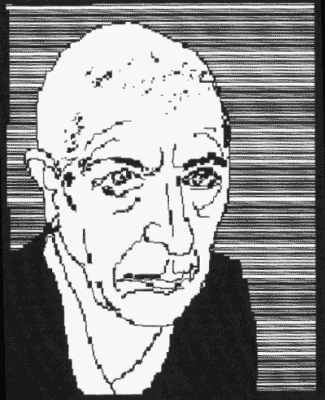by Charles Carreon

Sometimes an artist produces one work too many. The one that shows he is not only past his prime, but has actually gone to seed. With Ten New Songs, the listener witnesses a great talent going into eclipse.
This is not that grizzled troubadour of the bizarre, who filled acid-soaked brains with images like "then you killed the lights in a lonely lane, and an ape with angel glands, erased the final wisps of pain with the music of rubber bands." It is not that one who immortalized Suzanne, and reminded us that Jesus was a sailor, etc. From the deck of Leonard's ship, you could see Salvador Dali, feverishly painting a surreal other shore.
No such fervid imaginations illuminate Ten New Songs, but the title is still descriptive, for Cohen has certainly come up with a “new” way of singing without having a song in his heart. But soon he will be quiet forever, or so he keeps reminding us. Whence came this strange malaise? Cohen has spent the last five years, they say, in a Zen monastery. This would seem to be borne out by the bizarre tilt of his thoughts, such as "I don't trust my inner feelings -- inner feelings come and go." This may be proper Buddhist dogma, but it isn't the stuff of good music. This is a New Song indeed -- one that ventures indifference as a musical theme. It is actually the worst CD I have ever heard.
I only listened to six and half of the Ten New Songs, but even this brief encounter had a depressing effect similar to a long chat with a suicidal friend. If it weren't for the depressing effect, however, the CD would be useful for lowering blood pressure. The pacing of these compositions is elephantine. To call them sedate overstates their stimulating effect. Torpid would be more like it. In one tuneless tune, Cohen dwells obsessively on the image of "dark rivers." I felt like I'd won a free vacation to buy time share in the underworld, and Cohen was the salesman. He was very convincing. I felt dead already.
Zen meditation seems to have lowered the temperature of Leonard’s mind. In one New Song he says he’s turned to ice within, and finds it “crowded and cold” inside himself. One is tempted to caution him to be wary of falling into the same fate as the senescent Ram Dass, who meditated himself into a stroke by visualizing himself as an old man with failing extremities and vision. His adventure of the imagination precipitated exactly what he contemplated, and he now is rolled about by his spiritual nabobs in a wheelchair he calls his “swan boat.” If the lethargic rhythms of the New Songs are any indication, Leonard may be drifting a little close to the big drain that goes straight down. The pulse of this music is so faint as to be nearly comatose, tending toward flatline.
From his present vantage point, Leonard Cohen sees no light, or if he does, he brings no report of it. He has one direction resolved, as well -- deeper into the shadowland. He says he knows he's forgiven, but doesn't know exactly how. I was left wondering when he'd been found guilty, and if his sentence was perhaps too severe. Leonard seems to be seeking closure and resolution, coming to terms, preparing for the end. But from the results displayed in these New Songs, I suspect he would have been better off keeping his accounts open, getting and spending the rich treasury of the imagination. In this album he seems hypnotized by the anticipated darkness of death. Tragically, his song has preceded him to the grave.